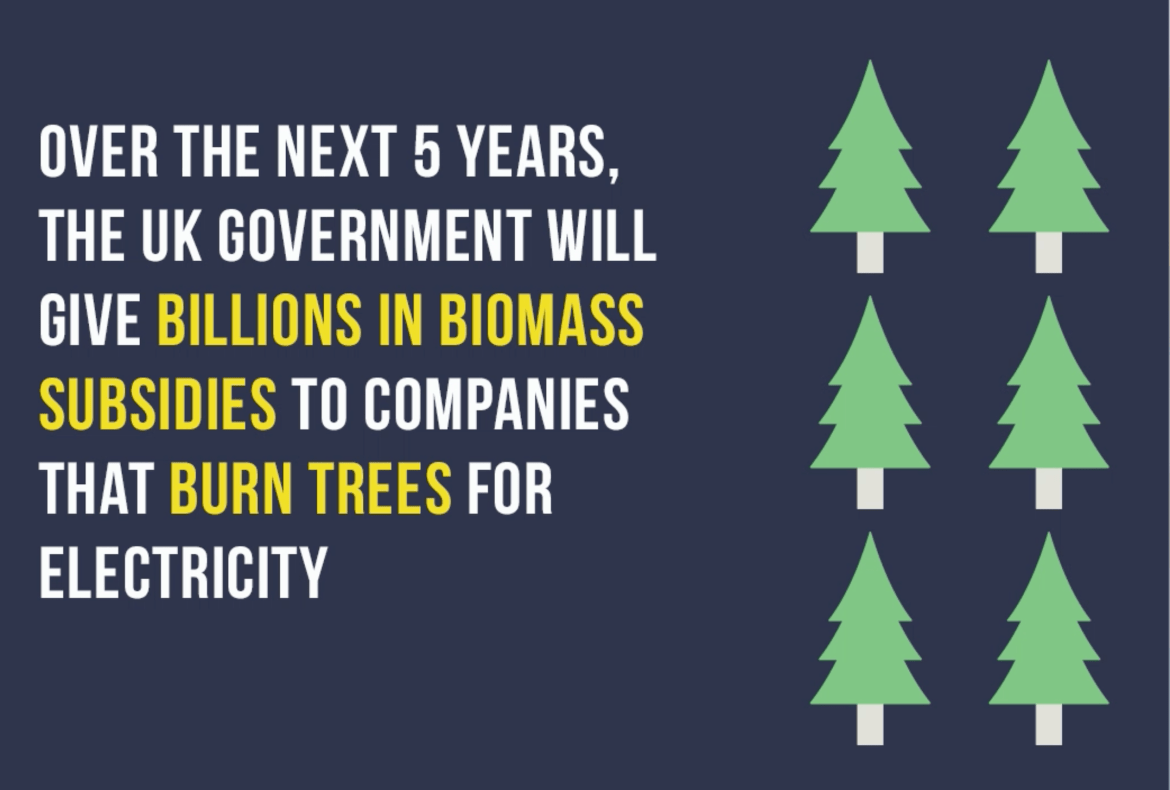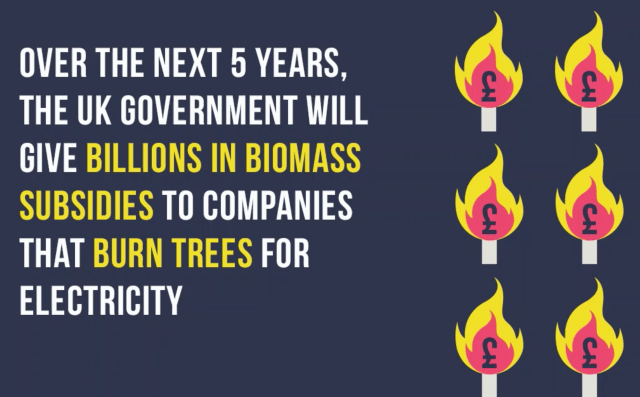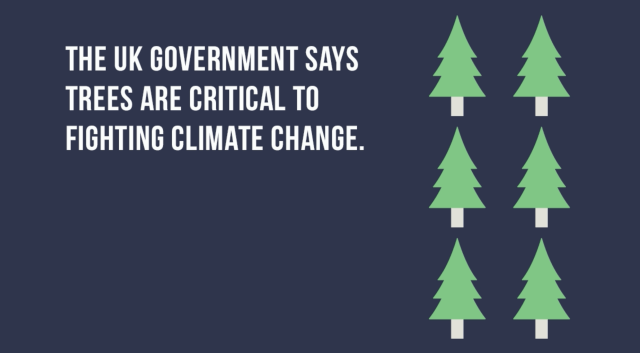[ad_1]

The promoting and advertising and marketing advertising and marketing marketing campaign group ‘Lower Carbon Not Forests’ has shared a mannequin new infographic that tells the story of the UK authorities’s hypocrisy on forest conservation and native local weather — displaying that right now, timber want our voices.
Lower Carbon Not Forests is a hard-hitting promoting and advertising and marketing advertising and marketing marketing campaign from a coalition of environmental advocacy teams to level out the UK’s wasteful subsidies for companies that burn timber for electrical energy and to place stress on policymakers to help reform.
The multi-channel group, led collectively by Biofuelwatch, Dogwood Alliance, the Pure Property Security Council and the Southern Environmental Legal guidelines Centre, requires an finish to biomass burning subsidies, redirecting billions of kilos to fill a “essential funding hole” for numerous renewable power decisions, identical to wind and {photograph} voltaic.
Watch the infographic beneath…
Based mostly totally on the coalition, the UK is a really highly effective consumer of biomass electrical energy in Europe, backed by bigger than £1 billion (€1.1 billion) per 12 months in authorities subsidies, paid out by way of a payment on power funds. The group says burning wooden in energy stations is “no larger for the native local weather than burning coal”.

Lower Carbon Not Forests’ new infographic contrasts the realm of forest the federal authorities pledges to plant with timber as a part of its “Nature for Native local weather” fund with the realm of forest which can must be scale back down over the an equivalent interval to supply the UK’s big demand for wooden to burn as gasoline for electrical energy.
A fame for motion to assist our timber
A contemporary YouGov polling referring to public attitudes contained in the UK about biomass power confirmed that fewer than one in 4 Britons (23%) suppose electrical energy generated by burning wooden from forests need to be categorized as renewable power, whereas massive majorities (upwards of 80%) as soon as extra the Authorities supporting wind and {photograph} voltaic power.
85% of respondents anxious relating to the impact on wildlife if timber in forests are being scale back all the best way wherein all the best way all the way down to generate electrical energy – a really highly effective end finish outcome contained in the survey.
And for the reason that COVID-19 lockdown has been eased, 82% of respondents furthermore agree that the UK should intention to protect enhancements in air top of the range by switching to power sources with no related air air air air pollution emissions. Burning biomass from forests in precise reality releases harmful air air air air pollution like particulate matter, along with native local weather air air air pollution.

Lower Carbon Not Forests, is rallying constituents to contact their Member of Parliament and press for an finish to subsidies.
Their promoting and advertising and marketing advertising and marketing marketing campaign’s determine to motion urging MPs to redirect billions in biomass subsidies to express clear and renewable power like {photograph} voltaic and wind will possible be discovered correct proper right here.
In conditions of direct motion, activists have furthermore begun lining the put collectively tracks carrying wooden pellets to the Drax plant, an indication of defiance in opposition to this soiled power.
Undermining environmental conservation and native local weather targets
The Environmental Audit Committee merely nowadays achieved a fame for proof on biodiversity and ecosystems, searching for enter on the best way wherein it may probably larger combine and improve its efforts to deal with biodiversity, native local weather change and sustainable enchancment.
These are laudable targets. Nonetheless the UK authorities’s tree planting and worldwide forest conservation efforts are dwarfed yearly by the size of dangerous subsidies that it continues to produce power companies that import wooden from abroad forests to burn for electrical energy beneath the guise of producing renewable power.
This isn’t solely wasteful financially, nonetheless counterproductive to environmental conservation and native local weather targets. Think about the next:
- Per her response to a query tabled by Rosie Cooper MP referring to native tree planting, the Secretary of State for Setting, Meals and Rural Affairs acknowledged that, contained in the 2020 Price fluctuate Assertion, the federal authorities launched a £640m “Nature for Native local weather fund” for England. Based mostly totally on the announcement, this may increasingly more and more counsel an extra 30,000 hectares of timber (roughly 300 sq. kilometers), “a forest bigger than Birmingham,” over the following 5 years.
Nonetheless, in 2019, wooden pellet sourcing for Drax’s coal-to-biomass conversions at Drax Vitality Station alone required sourcing of over 7 million tonnes of wooden pellet, roughly 4.5 million tonnes of which had been sourced from forests contained in the southern United States.
Supplying this demand required the harvesting of roughly 340 sq. kilometres of forests contained in the area. At this diploma, 5 years of current thus requires 1,700 sq. kilometers of harvesting, equal to 6 occasions the realm the UK intends to plant by way of the “nature for native local weather fund.” And as quickly as further, Drax truly imported bigger than 1.5 occasions that from all sources in 2019, so the complete forest harvest impact is definitely tons larger.
- And ultimately, per the response Ms Cooper acquired from the Secretary of State for Worldwide Enchancment, DFID tales that it has invested £57.2 million (2017-18), £53.1 million (2018-19) and £50.8 million (2019-20) in bilateral forest programmes over the sooner three years. This implies the UK’s annual abroad forest conservation funding is lower than 4% of what it spends to subsidise importing wooden from abroad forests to be burnt for power yearly.
Taken collectively, it’s clear that billions in UK biomass subsidies crowd out completely totally different efforts at forest conservation.
Burning timber
Biomass subsidies help the harvest and burning of massive elements of timber from ecologically delicate forests all world broad for electrical energy, contributing to their degradation and endangering the wildlife that rely upon them.

Inserting an finish to as rapidly as and for all to the UK’s damaging legacy of reliance on biomass electrical energy is critical to serving to reverse the biodiversity disaster and must be on the core of how the UK bolsters its conservation insurance coverage protection insurance coverage insurance policies and invests in a extremely inexperienced restoration from the COVID-19 pandemic.
What’s at stake correct proper right here is upwards of £1 billion per 12 months, at present paid to companies that burn timber for electrical energy, nonetheless fully on the Authorities’s discretion to half out and reinvest in exact native local weather and conservation decisions.

[ad_2]

